- Home
- Kendare Blake
Five Dark Fates Page 12
Five Dark Fates Read online
Page 12
“The Vatros clan,” Jules says. “Emilia, your father signed.”
“That does not surprise me.”
“Didn’t we already have the allegiance of the warriors?” Arsinoe asks, confused. “What does this matter?”
“You had those warriors loyal to the Vatroses,” Margaret says. “But you did not have all. Now you do.”
“Now we do.” Jules’s eyes narrow. “And we should trust this? Trust you?”
“That is up to you. It is why I came myself, rather than sending a messenger. I knew Emilia would not believe me unless she could look me in the eye.”
“And you believe her?” Jules asks.
Emilia glances sidelong at Margaret, and the hairs on the back of Arsinoe’s neck begin to prickle. She has never seen Emilia look unsure or vulnerable. Now she appears to be both.
“Margaret Beaulin has been a bootlicker to the poisoners for a long time,” Emilia says. “But perhaps she is not anymore. If we can trust this, it would be useful. One of the war-gifted is worth twenty regular rebel soldiers.”
“Regular rebel soldiers,” Arsinoe says. “What about the elemental fighters with their lightning and fire? What about the naturalists with fierce dogs and cavalry?”
“With Bastian City, we can lay siege to Indrid Down,” Emilia goes on. “Our forces can cut their access to the harbor from the north—”
“And mine can cut off their path to the river, from the south and east.” Margaret nods. “And if somehow the Undead Queen should rout us, all forces can fall back to Bastian and make a stand behind the city walls, which have stood longer than even the Volroy.”
“But only if we trust you,” says Jules.
“Would it be easier to believe me if I demanded a seat on your new Black Council in return?” Margaret raises her eyebrows. “I considered it.”
“If that isn’t your demand, then why?” Jules asks.
“For Emilia,” Margaret replies. “Because I failed her and I owe her a debt. And because I failed her mother,” she adds quietly. “Whom I loved.”
Arsinoe glances between Emilia and Margaret, each in pain merely by being in the other’s presence. Whatever happened between them was not kind.
“Bastian City is proud, but you can’t deny it’s a city in decline,” Jules says, and rolls up the treaty. “How well fortified is it presently?”
“Very well fortified.”
“Then send us a supply of weapons. Spears, crossbow bolts, swords, and shields. Whatever you can spare. Send us that, and we will consider you allies.”
THE VOLROY
In the Black Council chamber, Katharine sits at the head of the long table of dark wood. She is restless and troubled, and her patience for another meeting of arguments is stretched thin. The High Priestess had the gall to suggest that Mirabella be allowed to sit in on the council meetings, but the notion was quickly silenced. And even had the opposition been less vocal, Katharine would have forbidden it herself.
The dead queens, in their eagerness for Mirabella, have forced Katharine to remain distant from her sister. Every time they see her, they rush to Katharine’s surface with such force that her head spins. And soon, they will find a way to take what they desire.
Unless Katharine finds a way to distract them.
“Has there been any word about Jules Milone?” Katharine asks.
“The Legion Queen has not been seen since the battle at Innisfuil,” says Genevieve. “Though her forces still rally to Sunpool. And it seems we have lost Wolf Spring.”
“To lose something,” says Cousin Lucian, “we must first have had it.”
“Had them or not,” Genevieve says mildly, “we hoped they would remain out of play. The island over knows that the naturalists do not take sides. That they have involved themselves in the conflict may seem to some like a tipping point.”
Katharine looks to Rho Murtra, her Commander of Queensguard. “Has the entirety of Wolf Spring emptied? Or only those tied to the Milones?”
“Our spies say the group was large,” Rho replies. “But it was by no means the whole city. Genevieve is, as usual, overstating the situation.”
“And what word of Arsinoe?”
“What last we heard, she did not believe that Mirabella had defected. She ordered search parties into the hills and along the cliffs, as if Mirabella had simply fallen out of a window.”
Around the table, the Black Council snickers.
“Stop that,” Katharine snaps. “Before my sister hears you and sets you on fire.” She glances at Bree, who winks.
“Arsinoe’s denial is good evidence that Mirabella can be trusted.” High Priestess Luca sets her hand on the table, her expression serene.
“I do not like it.”
Everyone on the Black Council turns to Rho. She is the last person expected to speak against anything the High Priestess says.
“What do you mean,” Luca asks, “you do not like it? What do you not like?”
“It seems too easy. Like that day at Innisfuil seemed too easy.” Rho turns to Katharine, her white hood down inside the council chamber, her hair, red as blood, falling over her shoulder.
“Too easy,” says Genevieve. “Have you forgotten how many queensguard we lost? How many—”
“The Legion Queen is not dead,” Rho replies. “And Arsinoe now has a strong adviser in Cait Milone.”
“So what do we do?” asks Lucian.
“Nothing,” says Antonin. “We wait, and see if they will fray. And we cannot march on them anyway until spring.”
High Priestess Luca leans forward. “The parade for Mirabella will ease these concerns. Flaunting her will show the rebels there are two queens to fear, and her usefulness against the mist will increase your popularity.”
“This is a mistake.” Lucian Arron shakes his head.
“Cousin Lucian. Lucian,” Katharine corrects herself, since there are no longer two Lucians on the council and it is unnecessary to give him the fondness of the familial title. “We have had spies and soldiers in her shadow since the moment she arrived. She has made no attempt to contact the rebels and no attempt to flee. And even if she were to go, what would it matter? She knows nothing now that she did not before. And we would be no worse off.”
She turns to Bree. “Bree Westwood. What is your opinion? What are your observations of your old friend since she arrived?”
Bree presses her lips together. Whenever the council business has turned to Mirabella, she has remained quiet. Usually with her eyes fixed on her lap, careful to appear neutral.
“She still has love for Arsinoe,” says Bree. “She always will. But she was raised a queen. Her loyalty is to the people and to the crown.” Bree looks at Katharine and arches her eyebrow. “And she is more than a little afraid of you.”
“Flattery,” Lucian mutters.
“Truth,” Bree snaps.
“Enough.” Katharine raises her hand. “If you do not want me to show Mirabella to the people, then what would you have me do with her? House her and feed her in secret in exchange for nothing? What if the mist moves against the city? Should she be kept hidden away until then, so she can come charging out like an unexpected savior?” The corners of her mouth twist down. “Surely, that would do nothing to make the people remember how . . . popular she was.”
“There is something else.” Renata Hargrove clears her throat and demurely places her hand upon the table.
“Renata,” says Katharine. “And what is that?”
“As Genevieve has maintained spies within the rebellion, I have maintained spies elsewhere. Including within Bastian City.”
Genevieve crosses her arms and leans back, eyes narrowed. “You have been in contact with Margaret Beaulin.”
“Until recently, I believed her loyal, despite her dismissal from the Black Council.”
“But that is no longer so?”
“She insists that she is still with us,” says Renata. “But that is not what my spies say. They say she left for Sunpool
, with a signed treaty, to declare the city for the rebellion.”
“A signed treaty? Who signed it?”
“The head of every major family of war-gifted.”
Katharine sits, overcome. “How has this happened? How has the crown lost Wolf Spring and Bastian City? At least Mirabella may help us keep Rolanth!”
Rho Murtra slides her palms eagerly across the wood. “We might also march on Bastian.”
“Now?”
“There are no mountains between us. No reason to wait for a spring thaw.”
“No,” Antonin objects. “We should hold our resources until the spring.”
“When the rebels can march from the north and Bastian can flank us with warriors,” Rho says, and lazily reclines. “It is clear that poisoners have led few battles.”
“Because respect for us has kept anyone from rising in the first place,” Antonin hisses, “for the last hundred years!”
“Enough.” Katharine stands, signaling the meeting’s end. “You have all been heard. And now I will consider the options.”
After the Black Council disbands, Katharine retires to the privacy of her rooms in the West Tower.
“Is there anything you need, Queen Katharine?” her maid asks.
“No, Giselle,” she replies. “Not just now. And when you go, please bar the door.”
The loss of Bastian City and the betrayal of Margaret Beaulin are regrettable. But Katharine cannot help but be pleased. She could not have asked for a better solution to fall into her lap.
“Dead sisters,” she whispers to her reflection in her dressing mirror. “Our reign is once again threatened. I would have a word.”
She steps closer as the dead queens rise. Had someone else been watching, they might not have detected the change—a subtle shift in her facial muscles, a tremor in her iris, a small collection of tics belonging to many different queens—but she can see when they have drifted out of her blood and into her skin.
What word? they ask, and hiss. What threat?
“The war-gifted move against us. They would turn from the crown and join the rebellion.”
The rage of the dead queens ripples across her face.
They must not. They cannot.
“They will unless we stop them.”
Yes. Stop them. Kill them.
“But I cannot go. I am needed here.”
We must ride. Ride with the army.
“Yes,” Katharine says carefully. “But you must go alone.”
We cannot go alone. We have no body and no blood. You are our vessel.
“What if I gave you another one?”
Mirabella . . .
Katharine’s voice hardens. “No. Not Mirabella. Never my sister,” she says, and clenches her teeth as the dead queens continue to whisper Mirabella’s name. “Someone else. Can you move into someone else?”
Not permanent. A lasting vessel must be of the blood.
Of the blood. Queensblood.
“Temporarily, then. How is it done?”
They fall silent. Katharine tenses.
They must be willing. Or they must be weakened.
“Weakened? Like I was when I fell down the Breccia Domain.” They say nothing. She hears only the multitude of their breaths. “No. I cannot do that. The temporary vessel must be willing. And you will still obey me when you are with them?”
You are our permanent vessel. You are a queen. Of our blood. Queen Katharine. Beloved.
“Good,” Katharine says. “I have the perfect soldier in mind.”
SUNPOOL
A few days after the Sandrins depart with baby Fenn, Arsinoe and Billy are roused from their room by a sight-gifted girl in a yellow cloak.
“Queen Arsinoe, Master Chatworth, please come with me.”
“Why?” Arsinoe asks, swinging her legs out of bed. “And why so early?”
“Um, Arsinoe,” Billy says, buttoning his shirt and looking down at the square from their window. “We’d better go. Everyone’s down there already—Jules, Emilia, Mathilde, even Cait and Caragh Milone. As my mother would say, something’s afoot.”
Curious, they ready themselves and go down to the square. They follow Jules and her entourage through the courtyard, past the now-working fountain with its statue of leaping fish. Parts of Sunpool have come alive again, cleaned and refurbished after the influx of new, skilled labor. Yet as they pass a few of the scattered oracles in yellow cloaks, Arsinoe feels a pang of guilt. The oracles were ghosts before as their numbers dwindled. And they are still ghosts now, their quiet and stillness overrun, pushed aside to make way for the war.
“Isn’t it strange?” Arsinoe says quietly to Billy. “They invite the rebellion here, yet they don’t seem to want a say in it.”
“Maybe it’s because they already know what’s going to happen,” he replies. “But it is odd. Since we’ve been here, I’ve only seen Mathilde speaking with Jules and Emilia. But Mathilde isn’t even a Lermont. The Lermonts are like the Arrons of this city, right?”
“She has Lermont blood,” Caragh says, overhearing. “Through her father’s side. I asked her about this very same thing just after I arrived. They let her take the lead because of all the oracles she is the most warlike. It’s sad. The sight-gifted have been made to feel so weak and unwelcome for so long that not even they always trust themselves anymore.”
“Somehow I think they trust themselves today.” Arsinoe and the others stop behind Jules as two oracles step out from behind the pillars of the colonnade. The cloister that they stand in and its rows of pillars are called the sight garden, a place within the castle walls for seers to commune and practice their gift in quiet. Arsinoe finds it both pretty—with its green grass and rows of flowering shrubs—and strange. It is full of scrying bowls filled with water or sometimes wine, and the pillars in the center of the green space support nothing, each with two stone benches at their base.
Arsinoe elbows her way to the front.
“Josephine, Gilbert,” Jules says, nodding to each of the seers. “Is Mathilde on her way?”
“I am here.” Mathilde approaches through the garden and embraces both oracles: one a tall, blond woman who looks a little like Mathilde and another an older man with hair nearly the same sandy shade as Billy’s. “I already know what they have seen.”
“Well?” Emilia asks. “What is it?”
The woman, Josephine, speaks. “We have seen a battle in Indrid Down. Forces swarming even to the base of the Volroy.”
Emilia smiles. “Good. When?”
“There was no snow. Beyond that, I cannot say. But I have also seen something else: Mirabella, on horseback beside the queen and clad in silver armor.”
“Her lightning could lay low whole fields of us,” Emilia says, glaring at Arsinoe. “And you thought she would never turn.”
“She hasn’t,” Arsinoe snaps. “She won’t.”
“There is more,” says Josephine. “An opportunity will arise to reclaim Mirabella. If you take that opportunity, she will not be at that battle. This is what the bones say.”
The bones. It does not sound like much to go on, to Arsinoe’s ears, but the only words that matter are “reclaim Mirabella.”
“When? When can we go get her?”
The oracle called Gilbert takes a deep breath. He walks to an empty scrying bowl and grasps the bottle resting against its base, uncorking it with a twist. Then he pours the deep red liquid into the shallow marble basin. Arsinoe swallows. She would rather he used water. The wine looks too much like blood.
Once the bottle is empty, the wine stills, faster than is natural, and the seer breaks the surface with the tip of his finger, moving in one circular swirl. His gift is strong. For a moment, Arsinoe swears she can see Mirabella’s face and flowing hair, and the glint of a silver breastplate.
“The Undead Queen means to hold a public parade through the capital,” Gilbert says. “To formally announce the allegiance between the two sisters. It will take place in six days.”
&
nbsp; “Six days,” Jules repeats. “Not much time.”
“The entire route will be heavily guarded,” says Mathilde. “She will have archers in the windows of every building and cavalry on the streets.”
Emilia puts her hands on her hips. “We cannot hope to escape with her. Not without an entire army chasing us back to Sunpool.”
“Perhaps we could lose them,” Jules suggests. “We could lay traps outside the city. Ambushes to slow them down as we make our way to cover.”
“A good suggestion. But ‘we’ are not doing anything. No matter what we decide, you will stay back. Out of danger.”
“A fight is the only thing I’m good for. You can’t hold me from it.”
The oracle Josephine clears her throat. “That is not all. We have seen that, if you take this opportunity, then Mirabella will not be part of the battle at the Volroy.”
“And?” Jules prods.
“But neither will you be.”
Arsinoe looks at Jules in shock. “What does that mean?”
“Speak, oracle!” Emilia advances on her angrily, but Mathilde steps in between them.
“If there were more to say, then she would have said it,” she says quietly.
Jules puts a hand on Emilia’s arm, and the warrior stands down. Jules nods to the seers. “Thank you. I need to speak to my friends. I would appreciate it if you said nothing of this until we have decided.”
They return to Jules’s private quarters, and Arsinoe, Emilia, Cait, and Mathilde accompany Jules inside to gather around the hearth. Billy, Luke, and even Caragh, she asked to wait outside.
“Friends,” Emilia teases. “You are a queen now. You must say ‘advisers.’ Or ‘counselors.’ Or ‘generals.’”
“If I’m a queen,” says Jules, “can’t I say whatever I want?”
She stands at her table and pours a cup of wine, but stares into it for a long time instead of drinking.
“You’re nervous,” Arsinoe says, and runs Camden’s tail through her hand. “I can tell because the cat won’t sit. What are you thinking?”

 Anna Dressed in Blood
Anna Dressed in Blood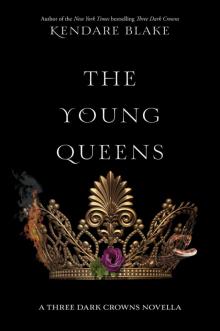 The Young Queens
The Young Queens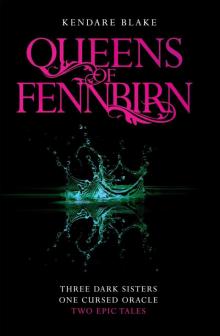 Queens of Fennbirn
Queens of Fennbirn Antigoddess
Antigoddess The Dogs of Athens
The Dogs of Athens Ungodly
Ungodly Mortal Gods
Mortal Gods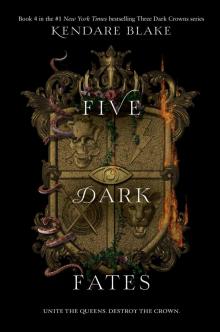 Five Dark Fates
Five Dark Fates Girl of Nightmares
Girl of Nightmares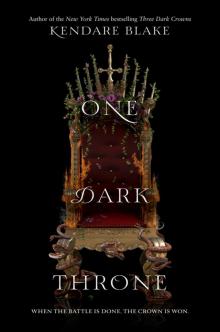 One Dark Throne
One Dark Throne Two Dark Reigns
Two Dark Reigns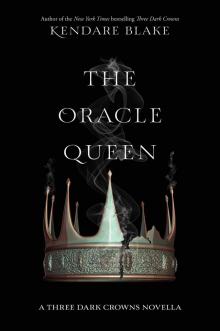 The Oracle Queen
The Oracle Queen Antigoddess gw-1
Antigoddess gw-1